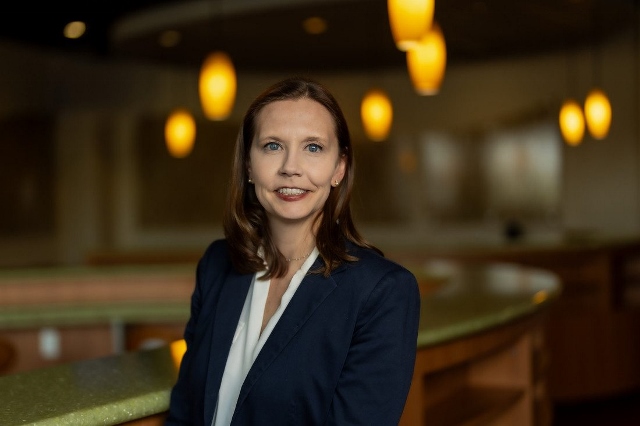In January, Sarah Clinton began her new role as vice provost for planning and strategy in the health sciences and technology division at Virginia Tech.
The position, based at Virginia Tech’s Fralin Biomedical Institute in Roanoke, will leverage her extensive experience in biomedical research on mental health, as well as her experience as an educator and administrator who helped foster the growth of the neuroscience department, according to Michael Friedlander, associate dean for Virginia Tech’s Fralin Biomedical Institute and vice president for health sciences and technology at Virginia Tech.
“We are thrilled to have Sarah join our team. She has a deep commitment to scientific research and a deep understanding of the scientific enterprise, but also a strong sense of responsibility to help others advance in their careers,” said Friedlander. “In addition, she has an eye toward the future and will be a great contributor to planning and driving the expansion of the biomedical and health sciences enterprise at Virginia Tech.”
Clinton will also serve as co-director of the Integrated Health Sciences Research Program, a selective academic program incorporating innovative biomedical science coursework and experiential learning opportunities for undergraduate students interested in careers in the biomedical and health sciences, including basic, translational and clinical research.
How would you describe your new position at Fralin Biomedical Research Institute (FBRI)?
Half of my role is internally focused: supporting faculty and new initiatives. This year, FBRI hired eight new faculty members who need to set up labs and bolster their support teams. By this summer, we will have over 40 core faculty members. My first goal is to connect with them, figure out what’s working well, and ask what areas they need support in. For new investigators, how do I help them get started and succeed? A big part of my direction is to enable research faculty to thrive.
The other half is externally focused. I got a taste of that on my second day at the company when I was invited to a conference. [community business leader] Haywood Fralin, Mike Friedlander, and the legislators who were there for the event. It was inspiring to hear them talk about the framework of the work we do as an institute. We work with so many partners, including Virginia Tech, Carilion Clinic in Roanoke, National Children’s Hospital in Washington, DC, the University of Virginia, Virginia Commonwealth University, and many others. Our philanthropists and community advocates are critical to our success, as are our government partners locally and in Richmond. There’s so much happening right now, and I’m excited to be a part of it.
How has your scientific background influenced your academic career?
I’m a neuroscientist by training, and my passion and research interest is mental health. How does stress affect the brain and nervous system? Why do some people who experience stress develop disorders such as depression and anxiety, while others don’t?
I was also interested in brain development, which I found exciting and fascinating, but over time I began to wonder where else I could make an impact, and I began to focus more on teaching (I have taught thousands of students) and mentoring other faculty.
What brought you to Virginia Tech?
In 2016, I was one of six faculty members hired into the new Neuroscience Department in the Virginia Tech College of Science. Since then, the school has grown from six to 23 faculty members and from 30 to over 800 undergraduate majors. While I focused on research early in my career, it’s been fun to be part of that growth, recruiting for expansion, and helping others get started.
One of the projects I spearheaded was something called the Assistant Professor Training School. As scientists, we’re trained to do great scientific research. But we’re not always trained to be administrators. Through that work, I found a new passion for mentoring new faculty and supporting their career development.
I moved from research to the service and management side of companies and understood what pieces of the puzzle needed to come together to make things work.
What surprised you about this change?
Early on, I felt the support and culture of camaraderie at the institute – a genuine caring attitude. I also didn’t realize how big an organization it was for such a relatively new institution. I was aware of it from a scientific perspective, but when you see 40 professors and their labs, all the people working in the labs, and the administrative support behind it, you really get the scale and scope of the operation.
Another thing that impressed me was the community engagement, from the Maury Strauss Distinguished Public Lectures to the Brain School and other outreach. I knew Virginia Tech had a positive impact on the community, but I was impressed by how much work we do. Academics and researchers tend to keep to themselves. I was thrilled with how many people came to the Brain School in March. These activities help us connect with the community and share the powerful work that is happening here.
“There’s a culture of engagement that permeates the entire operation with collaborations with graduate students in the School of Medicine, Translational Biology, Medicine, and Health Studies. And with FBRI research spanning cardiac health, health behavior, exercise medicine research, and cancer research, we have the opportunity to go beyond neuroscience. I’m excited to begin this new chapter.”
Lee Ann Kelly

